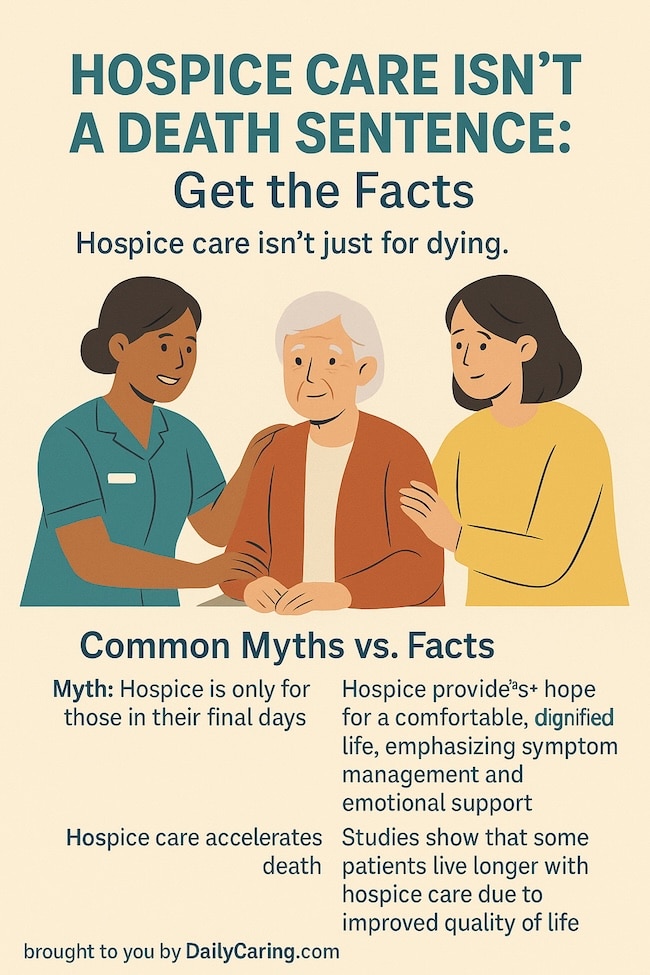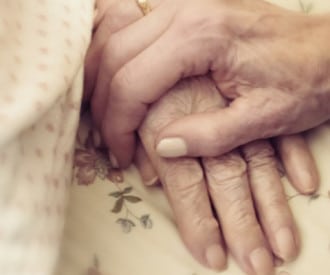Many families hesitate to consider hospice care, fearing it means “giving up” on their loved one. But hospice isn’t a death sentence; it’s a compassionate form of care designed to enhance quality of life for those with serious illnesses. By focusing on comfort, pain management, and emotional support, hospice helps patients live fully in their final months.
In this article, we’ll clear up common misconceptions, explain how hospice works, and highlight how it can bring peace and dignity to patients and their families.

Hospice Care Doesn’t Mean Giving Up
The biggest myth around hospice care is that it means giving up on your older adult.
Many people think that hospice care is only for people who are expected to pass away within days or weeks.
That’s not true.
Hospice is a type of medical care that aims to maintain or improve the quality of life for someone whose illness, disease, or condition cannot be cured.
Hospice addresses all symptoms of a disease, but has a special focus on controlling pain and discomfort.
It’s also focused on providing comfort and support to patients and families.
We explain why using hospice services shouldn’t be viewed as speeding up death or giving someone a death sentence.
We also describe who might benefit from hospice, how it helps caregivers, and how to speak with your older adult’s doctor.
Hospice Care Doesn’t Accelerate Timelines for Dying
Knowing that people who use hospice care don’t die faster is essential.
Sometimes, hospice patients may live longer because their quality of life has improved.
The main difference between hospice and “regular” medical care is that the focus is no longer on “curing” your older adult.
But realistically, many curative treatments carry high risks for older adults, aren’t as likely to succeed, and cause unnecessary suffering.

Hospice Care Isn’t a Death Sentence
To be eligible for hospice, a doctor certifies that the patient may not live beyond 6 months.
That may sound scary, but it’s not the same as the doctor saying they’ll die within 6 months.
Qualifying for hospice is NOT a 6-month death sentence
It just means that every 6 months, your older adult will need to be reevaluated to see if they’re still eligible to continue with hospice care.
In some cases, seniors aren’t able to continue hospice care because their health improves too much to re-qualify.
Who Might Benefit From Hospice Care?
Hospice programs are great for seniors in advanced stages of non-curable illness, who are very frail or at an advanced age. For example, someone with advanced dementia might qualify.
Under hospice, medical professionals visit the older adult. This is a massive relief for people who are too frail or ill to go to the doctor’s office.
Doctors also coordinate treatments so your older adult can feel as good as possible.
Hospice Care Helps Families Cope
Many folks don’t know that hospice care offers families much more support than traditional medical care.
Families benefit from:
- Having hospice professionals on call 24 hours every day
- Not needing to go to the doctor’s office because nurses visit the home
- Getting help with bathing and other personal care tasks
- Reduced costs – typically, hospice care is less expensive than hospital stays or ER visits
- Family guidance, support, and grief counseling
How to Get Hospice Care
Talk with your older adult’s doctor to find out if hospice could benefit them.
If it’s not a good option for your older adult, let the doctor know you’re open to discussing it when the time is right. That way, they’ll see that it’s something you’d like to learn about and consider in the future.
In the meantime, you can do more research to determine whether hospice could be helpful in the future.
Recommended for you:
- 9 Top Questions About Palliative Care vs. Hospice Care
- 7 Tips for Helping Seniors at the Doctor: Being a Health Advocate
- 5 Questions to Ask the Doctor About Tests and Treatments for Seniors
About the Author

Connie Chow
Connie was a hands-on caregiver for her grandmother for 20 years. (Grandma made it to 101 years old!) She knows how challenging, overwhelming, and all-consuming caring for an older adult can be. She also knows how important support is — especially in the form of practical solutions, valuable resources, and self-care tips.





My dad is in a nursing home due to having sepsis and yeast in his blood that caused a cardiac arrest. His cerebellum was damaged so he has short term memory from it and his motor skills aren’t great. I think that he would have done better if covid didn’t happen where he had to lay around for a year without therapy or my mom and I keeping him fighting and doing therapy. He was on a ventilator for 3 weeks so he is mechanical soft II and nectar thick drinks and he hasn’t walked or even stood up for over a year. His back is bad, but he always fought through the pain and walked with a cane for years. He wants to come home and my mom is 78 who broke her shoulder so she lost full range of motion of it and she won’t be able to change diapers easily. He will use a urinal if she is there with him. He speaks, but not clearly. He was on a ventilator for 3 weeks when this all happened. He isn’t terminal, but he is considered 24 hour care. He does have a g tube for nighttime feedings that has been in since they took out the tpn that caused his yeast and sepsis, but he does eat. This last month he finally gained a few pounds. He was 234 the day of surgery and went down as low as the low 150’s. He is now 164lbs. Does hospice provide care at home that his UHC Medicare would cover. He is currently self pay at the nursing home and it is taking his money fast. My dad was a very active man at 77 when he had surgery for a blocked bile that started all of this. He had a less than 10% chance of living and they told us if he did that he would be a vegetable, but God is stronger than their words and prayers pulled him through. We do want In home PT, OT, and speech therapy. Please let us know if this is something that hospice provides. Thank you.
We’re so sorry to hear about your dad’s health conditions. Hospice isn’t the same as in-home care and each hospice provider may provide different services.
It sounds like what you’d need is to hire in-home care as well as the additional therapy at home. Depending on the specific situation, Medicare may cover some of it, but you’d need to speak with the insurance provider and the doctor.
These articles provide more information:
– Choosing a Hospice Provider: Top Questions to Ask https://dailycaring.com/choosing-a-hospice-provider-important-questions-to-ask/
– Home Health Care and In Home Care: What Do They Do? https://dailycaring.com/home-health-care-and-in-home-care-what-do-they-do/
– 3 Tips to Choose Between Assisted Living vs In-Home Care https://dailycaring.com/3-tips-to-help-you-choose-between-assisted-living-vs-in-home-care/
– Medicare PACE Program Pays for In Home Care https://dailycaring.com/medicare-pays-for-in-home-care-under-the-pace-program/
– 4 Questions to Ask When Choosing a Home Care Agency https://dailycaring.com/4-questions-to-ask-when-choosing-a-home-care-agency/
– What Does Medicare Cover? Find Out Before the Bills Arrive https://dailycaring.com/what-does-medicare-cover/
Are you able to ask for assistance for someone who will be receiving hospice care at home for more than once a week?
To find out about specific services, it’s best to speak with the hospice company.
We share suggested questions to ask when looking for a hospice company here – Choosing a Hospice Provider: Top Questions to Ask https://dailycaring.com/choosing-a-hospice-provider-important-questions-to-ask/
Hospice can be offered even if the patient is in a nursing home and is part of my dad’s VA care. But there needs to be good coordination and communication between the nursing home, the hospice company, and the family. Everyone needs to know which entity is responsible for what kind of care, and to what extent that care will be given.
Great points! Hospice can be offered wherever the person is living and clear communication and coordination are essential for good care.
Absolutely. Hospice is a soul saver for patient, caregivers and family. I’ve experienced their wonderful philosophy and care with a couple of family members and friends.
They can tell you about the resources you don’t even know are options.
We’re so glad to hear that you had great experiences with hospice care! It can be such a wonderful source of support and information.